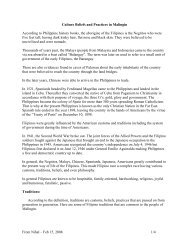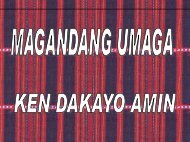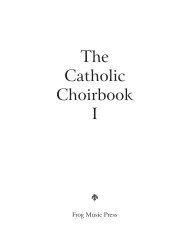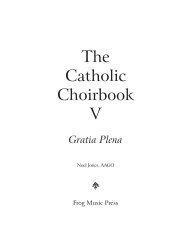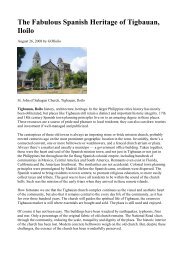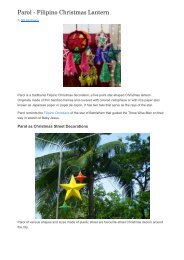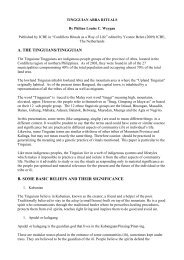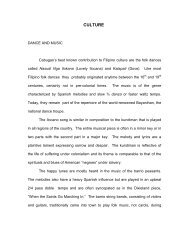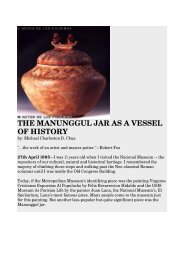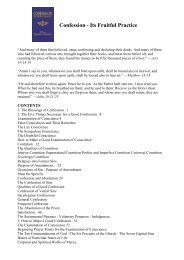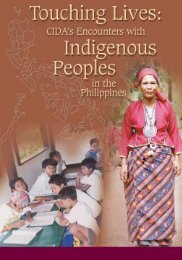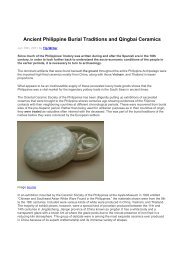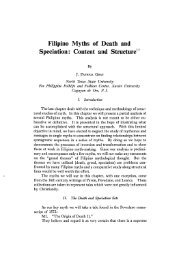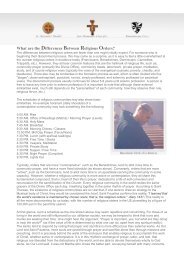IGOROT...Mountain People - Ethnic Filipino groups
IGOROT...Mountain People - Ethnic Filipino groups
IGOROT...Mountain People - Ethnic Filipino groups
Create successful ePaper yourself
Turn your PDF publications into a flip-book with our unique Google optimized e-Paper software.
<strong>IGOROT</strong>...<strong>Mountain</strong> <strong>People</strong>By Basho Fat Sumo/2006Basho Fat Sumo '99
In 1898 the Philippines passed from Spanish to American domain. This year alsomarked the 325th year of unresolved conflict between the "Ygolotes" and Spain.Although the highland foes had valiantly resisted - at great cost in human lives andpersonal property - a brutal and vastly superior force, they were never rewardedwith the respect normally due peoples who display such resilience and courage.The description by Friar Juan Villaverde of the culture and religion of his Ifugaohosts is typical: "These men, who appear from their mode of living more likebeasts of the forest than rational beings, whose privations and miserable state canonly be really understood by those who had seen it at first hand, these men liveswallowed up in the darkest shades of ignorance and enveloped in crass errors soobvious, so absurd and illogical, that they seem to be fables or children's tales
ather than ideas and concepts of men of judgment and reason. Unfortunately, thiscaricature of the Igorot by the Spaniards swept the thinking of the mainstreamPilipino, from the Spanish occupation through the American occupation of thePhilippines at the end of the 19th century and, to a significant extent, up to thepresent. And even while the Igorot has leapfrogged into the later part of the 20thcentury to become nurses, doctors, engineers, educators, lawyers, bishops,congressmen, governors, businessmen, ivy-league students as cum laudes, toppingprofessional national examinations in the Philippines, and other highachievements; they are still perceived by many as “primitive”. This has causedembarrassment on the part of many Igorots themselves who now prefer not to beidentified as “Igorot”. It is, however, the conviction of other Igorots not to hidefrom his true identity because of negative connotations but to turn the word,Igorot, “from a name of shame to a name of pride.”My intention to expound on social awareness for the word “Igorot” of its negativeand downgrading profiling stems not only from my relationship with the Igorots,but because in my friendship with these indigenous brothers and sisters of thePhilippine Cordilleras – the Ifugaos, the Benguet people, the Kalingas, theAbrans/Tinguians, the Apayaos, and other indigenous people - as well as lowlandimmigrants to that mountain range. I want to emphasize with greater awareness theword “Igorot” from its connotative negative implications, so that when you aremistaken for an Igorot, it will not be an insult, not taken as a derogatory remark. Iwant to project a better image of the term Igorot so that when you are mistakenlycalled an Igorot you can channel the negativity, but to just smile it off as you would,have you been mistakenly called a Chinese, Japanese, an Indonesian or Malay.With emphasis the word Igorot with its lingering negative implications by a non-Igorots when bestowed the name Igorot, would consider it an honor as I would feelhonored if I were to be referred to as a Kalinga, an Ifugao, an Abran/Tinguian, anApayao or other names of indigenous communities in the Philippine Cordilleramountain range.Since the conquest of Luzon by the Spaniards, the non-Christian tribes of theCordillera <strong>Mountain</strong> range of Northern Luzon were associated with the name“Igolot”, “ygollote”, or “Igorot” by the outside world (including PhilippineLowlanders). The term “Igorot” or its earlier variants means mountain dweller.Most likely, the name became handy in anthropological, cultural and/or geographystudies as well as for purposes of missionary, military, political and/or civil serviceadministration.It is true, many of the indigenous forefathers, perhaps even to this day, never heardof the name Igorot. Nor they ever experienced being called Igorots. But unknown tothem, books, reports, studies, movies, other print, motion and broadcast media,were being made referring to all of the tribal communities of the PhilippineCordilleras as Igorots.The Ifugaos were called Igorots by the Spaniards from the time they first foughttheir way into Kiangan in the 1750’s till the great student of their religion andcustoms, Father Juan Villaverde, died in 1897; and as late as 1907, they were callednot only Igorots but “true Igorots” by no less an authority than the late Dr. H. OtleyBeyer, who married one of them and was buried with full honors of traditionalIfugao custom in 1966.
In summary, the following can be said about the word Igorot. It is an indigenous<strong>Filipino</strong> word originally meaning “from the mountain”. It appeared in the earliestrecords of the conquest of Luzon, and by 1700 it was applied by the early Spaniardsto pagans living in the mountains of the present provinces of Nueva Vizcaya,Pangasinan, Ilocos Sur, Benguet, Bontok and Ifugao, and extended to Apayao in the1770’s and Kalinga in the 1880’sThe movie entitled “The Flight of the Sparrow, the settings of which were mostly inIfugao. This movie projected an image of a people similar in cultural practices - g-stringed, half naked, rice terracing, gangsa-beating, rice wine drinking, andinhabitants of the Cordillera <strong>Mountain</strong> Range of Northern Luzon – which theygenerally referred to as Igorots. Happy mountain people, warrior like, natureloving, reverence and showing respect to others, such movie has been shownthroughout the length and breadth of the Philippine Archipelago and even in foreignshores.When the Philippine Ambassador to the United Nations, Carlos P Romulo, wrote inhis book “Mother America, A Living Story of Democracy” that Igorots were not<strong>Filipino</strong>s, he was referring to the indigenous, pagan and culturally backward tribesof the old <strong>Mountain</strong> Province. The old <strong>Mountain</strong> Province was composed of Bontoc,Ifugao, Benguet, Apayao, and Kalinga. School textbooks referred to inhabitants ofthe old <strong>Mountain</strong> Province as Igorots.The acronym BIBAK had always been associated to the old <strong>Mountain</strong> Province andthe name Igorot. Thus, BIBAK students rose as a group to protest against Romulo’sstatement that Igorots were not <strong>Filipino</strong>s. So while being called ourselves by thename of the village or designated province, the outside world (including lowlandPhilippines) have bestowed on all of us the word Igorot by the fact that we were allmountain dwellers sharing a common geography and having similar customs andtraditions.While the “Igorot” historical reference to all indigenous mountain people ofNorthern Luzon may have been a misnomer as illustrious Ifugaos and Kalingaswould claim, historical accounts, text books, research papers and other print mediaas well as motion pictures on Igorot customs, traditions and culture may have beenwidely publicized to a point such that the mere mention or display of rice terraces,tribal dances, “wanes”, tapis, rice-wine drinking, beetle nut chewing and once-upona-timehead hunting practices were more often than not immediately associated withthe name Igorot.First, there are quite a number of Ifugaos, Kalingas, Apayaos, Abrans/Tinguiansand other inhabitants of indigenous communities in the Philippine Cordilleras whodo not mind being called Igorots and are even ready willing and able to defend theirIgorot identity. The need to identify a bias census to particularly identify those whodo not want to be called Igorots and those who do not mind being identified asIgorots.Second, countless Bontoc and Benguet Igorots have migrated to Ifugao, Kalinga,Apayao, and other parts of the Philippine Cordilleras and intermarried with thepeople therein. The same is true of many Kalingas, Ifugaos, Apayaos, andAbrans/Tinguians, other cultural minorities of the Philippine Cordilleras and<strong>Filipino</strong> lowlanders. They have migrated to other places and intermarried withBontoc and Benguet Igorots. What then shall we call the offspring of such interethnicmarriages? Will you then opt to disown such offspring if they have Igorotblood?
Some of these children, including unborn children, could be your very own flesh andblood. For nobody can really plan and dictate to what ethnic tribe his/her child orgrandchild should not marry into. Thus, would it not be better to join the crusadeequality and mutual respect to original ethnicity, making it much easier to acceptchildren of mixed (Igorot and non-Igorot) parentage into your respective families?So, whether you like it or not, our peoples’ destinies are closely intertwined. Thesuccess of togetherness initiated for the betterment of respective provinces or ethnicorigins will be a significant factor in the quest for the overall progress of thedescendants, relatives and friends of the rice-terracing, gangsa-beating, rice-winedrinking,beetle-nut chewing, and once-upon-a-time head hunting tribalcommunities of Northern Luzon.Instead of citing the Igorots for their countless sons and daughters who sacrificedtheir lives in defense of Philippine Democracy – during World War II, thehukbalahap and Muslim insurgencies, not to mention the Korean and Vietnam wars– many of our <strong>Filipino</strong> countrymen, would rather over look that kind of sacrificeand instead picture the Igorots dwindling in the crowd as unclean dwellers.Instead of sympathizing with the Igorots whose mineral, timber, agricultural, andwater resources have been exploited for the sake of national progress, not a few ofour country men would rather overlook such contributions of Igorot patrimony tonation building and instead discriminate against the Igorots.Instead of projecting a better image of the Igorots to accelerate their integration intothe mainstream of Philippine society, not a few Pilipino would rather alienate theIgorots by perpetuating derogatory stereotyping against them.Instead of standing by and defending their people, not a few Igorot sons anddaughters have succumbed to the pressure of derogatory Igorot stereotyping andwould rather discard their Igorot identity.It is sad to say, it is only from our Pilipino countrymen and in our very ownindigenous tribal communities in Northern Luzon where discrimination againstIgorots often times rear its ugly head and can easily proliferate and becomedisruptive to regional and national development efforts if left unchallenged.I am Igorot, I got one foot forward to the modern world and one foot backward tothe old ways but I am now educated, I can speak two languages and four Philippinedialects, I am a warrior, I can read and write with my pen using any ability I possessin pursuit of justice for everyone in mutual respect and harmony …I am Igorot forlife! Are you an Igorot? Come walk with me in the mud!



